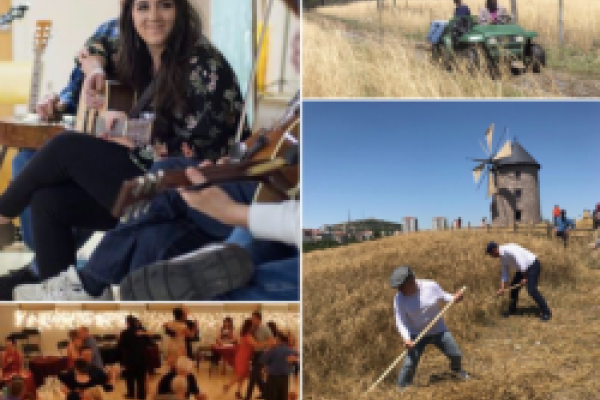
On Tuesday, December 3 from 3:30 p.m. to 5 p.m., join current folklore graduate students and new professionals at the Humanities Institute in 198A Hagerty Hall for a panel discussion and Q&A on fieldwork experiences and what to expect (or unexpectedly encounter!) while in the field.
Panelists will discuss their fieldwork contexts (their research questions and contexts) as well as a specific topic from their experience that is interesting and helpful for graduate students about to go into the field.
Panelists
Sophia Enriquez (PhD Candidate, Ethnomusicology): Sophia will present on "vulnerability as ethnography: identity, person-political potential and decolonial approaches." She will incorporate her perspectives as a Chicana-Appalachian ethnographer who is steeped in Appalachian folk music communities. Specifically, she will share her experiences building relationships through community-engaged work and discuss how vulnerability as a relationship-building tool yields productive ethnographic insights.
Rachel Hopkin (PhD Candidate, English): Rachel Hopkin’s ethnographic research focuses on a diverse community of people who dance Argentine tango in Cincinnati (n.b. Argentine tango is NOT the same as ballroom tango). She looks at how a transplanted traditional practice (tango) can catalyse the creation of social networks and constructions of self in a new cultural context and offers a means of accessing new ways of thinking about gender, age identity, affect, group formation and tradition.
Jasper Waugh-Quasebarth (Postdoctoral Researcher & Public Folklorist, Center for Folklore Studies): Jasper will discuss “Ethnographic Apprenticeship and Working Fieldwork.” His presentation will explore apprenticeship as an ethnographic method, demonstrating the ups and downs of using work and situated practice as a primary method of participant observation. Jasper’s apprenticeship to musical instrument artisans from 2016 to 2018 provided an opportunity to recast fraught power relationships in ethnographic work and opened up moments of critical reflection on the work of ethnography and ethnographers.
Nathan Young (PhD Candidate, Near Eastern Languages & Literatures): Turkey is often understood according to state-sponsored narratives of development, urbanization and secularization. However, persistent affinities, loyalties and connections to small-scale, rural locales challenge these "official" discourses. Nathan conducts ethnographic fieldwork in and around the Turkish cities of Izmir and Ankara to theorize the ongoing place of village lifeways present in personal and national imaginaries. He uses theories of nostalgia to conceptualize various contemporary social-cultural phenomena.
This event is sponsored by the Center for Folklore Studies (view this event description on the Center for Folklore Studies' website). It is free and open to the public. To ask questions or receive more information about this event, contact Mariah Marsden (.11).
